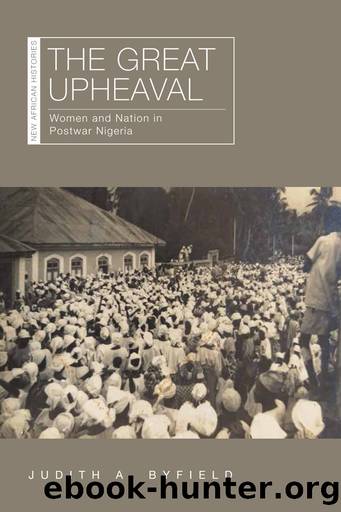The Great Upheaval by Judith A. Byfield

Author:Judith A. Byfield [Byfield, Judith A.]
Language: eng
Format: epub
Tags: History, Africa, West, Social Science, Women's Studies, Political Science, Colonialism & Post-Colonialism, Social History
ISBN: 9780821446904
Google: NPoxEAAAQBAJ
Publisher: Ohio University Press
Published: 2021-07-09T01:05:13+00:00
The Tudor-Davies Commission took six months to complete its report. Based on its calculations, the commission agreed with the unionsâ estimates and recommended a 50 percent increase in the COLA, retroactive to August 1, 1945. They did, however, discount the unionsâ suggestion that the COLA should be the same across the country rather than determined by local conditions. The report demonstrated that the commissioners discounted some of the governmentâs arguments as well. For example, they rejected its claim that the increase in allowances would accentuate inflation, and they âregarded the Governmentâs argument that it could make the allowance only by increasing taxation or postponing social and development work as irrelevant, as a reply to the unionsâ case.â40 The commission exercised a degree of autonomy that colonial officials did not expect.
While the unions celebrated the commissionâs recommendations, the governor of Nigeria, Arthur Richards, was beside himself. Noting his disappointment and embarrassment, Richards cast aspersions on the commission and its findings and recommended that the government not publish the commissionâs report. In a secret letter to secretary of state for the colonies, George Hall, Richards wrote, âI am now faced with conclusions and recommendations which appear to be based neither on logical argument nor on proved facts but which appear to represent the superficial opinion formed by three gentlemen, with no previous experience of Colonial conditions, after a short visit to Nigeria. I make so bold as to say, with great respect, that had I known that this was likely to be the outcome, I should have preferred to rely upon my own opinion and judgment.â41 The governorâs attitude was not shared by all in the Colonial Office, for the report was published and made available to the public for 3/6d. through the British governmentâs official publisher and booksellers.42 An editorial in the magazine West Africa praised it as âthe deepest probe yet into West Africaâs Social Problemsâ and applauded the broad way in which Tudor-Davies interpreted the commissionâs terms of reference. The editorialâs author enthusiastically endorsed the committeeâs recommendations and lauded its language of urgency.43
The successful outcome of this strike holds an important place in Nigerian labor history, but it was significant for additional reasons. It was the largest work stoppage Nigeria had ever experienced up to that time; given the role of the railway union, the strike extended into the provinces beyond Lagos; it had the support of people from a cross section of society; and, as Cohen suggests, it âraised the possibility of co-operation between the unions and the more populist-inclined politicians.â44 Imouduâs alliance with the NCNC deepened as he joined the organizationâs crusade against the new constitution imposed during Governor Richardsâs tenure.
AN EMERGENT NATIONAL POLITICS
The Richards Constitution built on administrative initiatives carried out by Richardsâs predecessor, Gov. Bernard Bourdillon. In 1939, Bourdillon received permission from the Colonial Office to subdivide the Southern Province into two regions. A series of political crises in the Yoruba provinces demonstrated that it was difficult for the chief commissioner to remain on top of developments in the western provinces from his eastern base in Enugu.
Download
This site does not store any files on its server. We only index and link to content provided by other sites. Please contact the content providers to delete copyright contents if any and email us, we'll remove relevant links or contents immediately.
| Central Africa | East Africa |
| North Africa | Southern Africa |
| West Africa | Algeria |
| Egypt | Ethiopia |
| Kenya | Nigeria |
| South Africa | Sudan |
| Zimbabwe |
Goodbye Paradise(3810)
Men at Arms by Terry Pratchett(2836)
Tobruk by Peter Fitzsimons(2516)
Borders by unknow(2313)
Arabs by Eugene Rogan(2299)
Pirate Alley by Terry McKnight(2221)
More Than Words (Sweet Lady Kisses) by Helen West(1867)
Belonging by Unknown(1855)
It's Our Turn to Eat by Michela Wrong(1730)
The Biafra Story by Frederick Forsyth(1656)
The Source by James A. Michener(1613)
Botswana--Culture Smart! by Michael Main(1601)
Coffee: From Bean to Barista by Robert W. Thurston(1544)
A Winter in Arabia by Freya Stark(1538)
Gandhi by Ramachandra Guha(1531)
The Falls by Unknown(1524)
Livingstone by Tim Jeal(1489)
The Shield and The Sword by Ernle Bradford(1409)
Africa: Altered States, Ordinary Miracles by Richard Dowden(1384)
